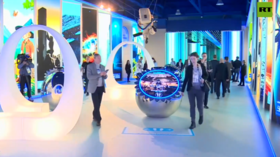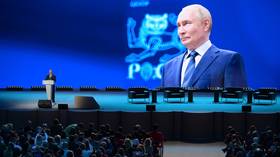Delegates from 100 nations gather for Russia-hosted global future symposium (VIDEO)

The ‘Inventing the Future’ symposium was launched at the newly built ‘Russia’ National Center in Moscow on Monday. Attended by more than 3,000 representatives from over 100 countries, the event focuses on scenarios for humanity’s development, as well as global ethical and philosophical challenges.
The three-day forum, running from November 4 to 6, brings together scientists, philosophers, futurists, popular sci-fi writers, and representatives from business and creative industries. Delegations include member states of BRICS, the Shanghai Cooperation Organization, the Commonwealth of Independent States, and various regions, including Africa, Asia, and Latin America. Participants include representatives from India, Italy, Iran, China, the UAE, Serbia, the US and France, according to the organizers.
The symposium’s agenda features more than 60 events categorized into several themes, including “Future of Humanity,” “Future of Technology,” “Future of a Multipolar World,” and “Future of Civilizations.”
In his greeting message to participants, President Vladimir Putin said: “We must determine our future ourselves, based on a sovereign worldview, national culture, tireless creative exploration, and a firm commitment to indisputable moral and patriotic ideals and values.” Then, he believes, “the boldest and most daring dreams will surely come true.”
“Our people have proven this many times in the course of our thousand-year history. It established a great power, opened the way to the stars for humankind, ensured the country’s leadership in the peaceful use of nuclear energy, and made great scientific and geographical discoveries. We and future generations should be worthy of their fathers, grandfathers and great-grandfathers,” he said in a statement published on the Kremlin website.
On opening day, Russian Foreign Minister Sergey Lavrov addressed the need for direct dialogue between nations and regions, which would contribute to forming a truly multipolar world and end the West’s neo-colonialist policies on the international stage.
“The role of regional and interregional interstate associations in Africa, Asia, and Latin America is strengthening. An important step toward multipolarity should be the establishment of direct contacts and horizontal links among them,” the minister stated, adding that “the West will come to its senses when it realizes that its colonial ways are harmful, including to the West itself.”
One of key events on Monday was a plenary discussion titled “Philosophy of the Future.” It focused on such topics as the formation of a society of the future, the impact of artificial intelligence on human life, and the development of technologies.
“The unity of a nation is determined not only by traditions, but also by the vision of the future; a dream, if you want,” deputy head of the presidential administration Sergey Kirienko said at the session.
“Of course… we are dreaming of a sovereign and strong country, a just world order, where people of every nationality have the opportunity to realize their talents, be happy and successful, and live in a safe world,” he said.
When dreaming of the future, we are bringing possibilities closer, according to Roberto Quaglia, an Italian science-fiction writer.
“Everything must start in the present, check against reality – so that we can make the correct predictions,” he said at the discussion, as quoted on the forum’s official website. Rapid development of technologies changes our lives so fast, “we can get lost in them,” he cautioned. In this context, he said, it is necessary “to accept the multipolarity of the existing world.”
Another participant in the discussion said the creation of concepts for living spaces in museums should shape the image of the future.
“We have pursued the path of immersive experiences and created an exposition to help people understand how technology affects decision-making,” said Majed аl-Mansoori, the executive director of the Museum of the Future in the United Arab Emirates. This was followed by a proposal to create a post of Minister of AI, he explained. In 2017, the UAE’s Omar Al Olama was appointed to the newly created position, becoming the first such minister in the world.
In addition to various panel discussions, the symposium features several major exhibitions. One showcases innovations and future plans, such as the Russian-Chinese project to establish a scientific station on the Moon, which aims to launch a nuclear power plant into outer space by 2035.
Another exhibition presents over 250 artworks employing diverse techniques – from painting to video art – created by talented young artists from Russia, China, India, Brazil, Ethiopia, and Iran.
The ‘Russia’ National Center was established in July to preserve the legacy of the International Russia Expo held earlier this year and to demonstrate the nation’s achievements on a permanent basis.













